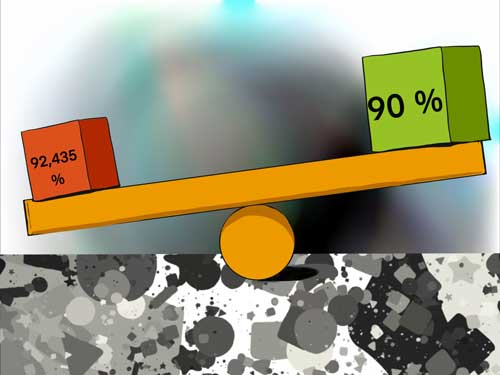People prefer round numbers to exact ones.Because exact, non-round numbers seem unfamiliar and difficult, many misjudge their value. Consider the following theoretical scenario: A vaccine against coronavirus is developed that is 91.27% effective. If the authorities publish this information with exactly this figure, most people will consider the vaccine to be less effective than if they had read that it was 90% effective. That, at least, would be in line with the results of a study to be published in November in the journal Organizational Behavior and Human Decision Process.
Keypoints:
- Most people prefer rounded numbers to exact values.
- Non-round numbers are perceived by consumers as lower than (lower) round numbers.
- Non-round numbers in a message text increase attention to numerical values.
The work by Gaurav Jain and researchers in behavioural economics at the University of Iowa, USA, looks at what is known as framing, which assesses how people make decisions when presented with information in a certain way.
Using six data sets and more than 1,500 subjects, the authors investigated whether and how the perception of information would change if exact or non-round numbers were used instead of round numbers.
As the research showed, most people perceive non-round numbers as unique and unsettling. They stand out like a black sheep in a flock of white sheep. That is why people tend to pause and think about such striking, specific numbers. Because the exact numbers are unusual and harder to understand, people tend to compare them to an easily understood ideal standard - say 100%.
The exact number is perceived smaller
Because the specific number then does not correspond to this ideal, people perceive it as being of lesser value. For small non-round numbers (such as 6.99%), however, the reverse is true: they would be compared to 0% and thus appear larger than they are. I doubt whether the last point is always true, because then prices like €5.99 would not make sense. The difference could be that there is no "ideal standard" when it comes to prices, and when we think of €5.99 we automatically think of €5, not €6. However, the study says nothing about this phenomenon.
"Numbers also have a non-numerical meaning. When we use exact numbers, they are subjectively valued lower. This phenomenon has surprised us incredibly, and there is no apparent reason for it."
Gaurav Jain, lead author of the study
Jain and his team did not study this question on the basis of a specific issue, such as communication about a possible coronavirus vaccine. But their research is of course very interesting for marketing and communication in all fields, as the use of non-round numbers can influence the subjective evaluation of readers.

